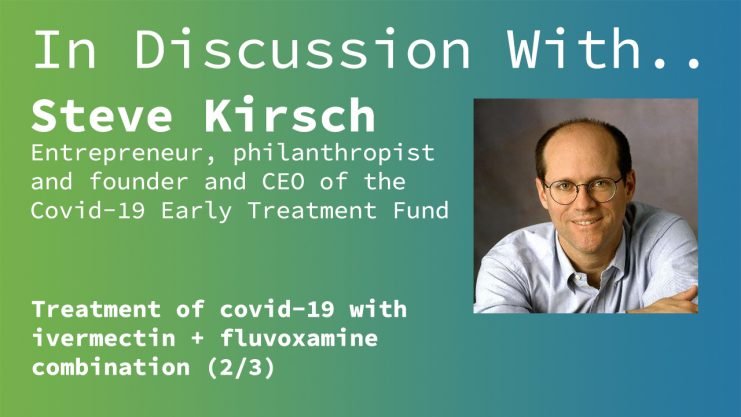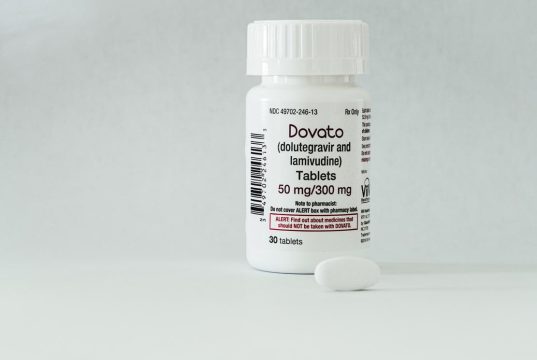Advertisment
Treatment of covid-19 with ivermectin + fluvoxamine combination

Interview and article by Christine Clark.
A combination of fluvoxamine and ivermectin for early treatment of covid-19 is highly effective and should be implemented widely, according to Steve Kirsch, founder and CEO of the Covid-19 Early Treatment Fund.
Ivermectin and fluvoxamine are two of the most effective drugs for the treatment of covid-19. In a recent meta-analysis ivermectin treatment reduced the risk of death by 68%.1 and two controlled studies of fluvoxamine both reported 100% success rates.2,3 The two drugs have different, but complementary, mechanisms of action. In a recent article Mr Kirsch set out the case for early treatment of covid-19 using the two drugs in combination, arguing that such an approach not only treats the acute infection quickly but also prevents ‘long-haul covid’.
“The doctors who have used the combined treatment have had very successful results. If you look at people who have combined multiple drugs like Dr George Fareed and Dr Brian Tyson – they treated over 6500 patients with a combination of drugs that is given as early as possible. Unless someone presents very late they get no hospitalisations ………..so the key message here is that if you get covid you should rush to use a proven protocol that has been used in other patients, that keeps people out of the hospital”, says Mr Kirsch.
“The main message for any of [the combination treatments] is, “Treat it early [and] use a doctor who has a protocol that has virtually zero hospitalisations” – and if you just follow that piece of advice we will see orders of magnitude lower hospitalisations than we do now”, he emphasises.
Although the evidence for effectiveness is robust, local government and health department officials are often reluctant to adopt early treatment protocols and frequently cite the National Institutes of Health (NIH) and World Health Organisation (WHO) as the main reasons for hesitation. Fluvoxamine is not mentioned in the WHO guidelines and the NIH guideline is ‘neutral’ on ivermectin.
Health officials usually claim to follow an evidence-based approach – but then ask for a level of evidence or level of certainty that will require very large trials over a period of years. “This is the ‘abundance of caution’ argument while people die ….. It’s basically “I don’t want to be shown to be wrong” versus “I want to maximise the number of lives saved”, says Mr Kirsch.
Mr Kirsch takes a more pragmatic approach pointing out that there is already ample evidence of effect and little or no evidence of negative effects. “As an engineer I looked at how to maximise the number of lives saved but a public health official is trying to maximise being correct”, he says.
The most powerful drug
Experience in clinical trials and in routine therapeutic use demonstrates the effectiveness of fluvoxamine. He adds, “When I talked to doctors about fluvoxamine they said, “This is the most powerful drug in my arsenal. I will never, ever give up this drug – it is unethical”. And yet I have this health official saying, “I can’t use this. It’s unethical for me to recommend this because there’s no proof that it works”. There’s a big disconnect between the two …and it’s troubling and it’s very unfortunate.” He also notes that Michael Ryan, executive director of the World Health Organization’s Health Emergencies Programme, advised on another viral infection, Ebola, “We shouldn’t wait – time is our enemy! We shouldn’t be afraid to make mistakes.”
Mr Kirsch has investigated fluvoxamine thoroughly and is so confident that the drug works that he has offered a reward of $1 million research grant to anyone who can demonstrate, based on the data, that fluvoxamine does not work.
References
- Bryant, Lawrie etc Lenze EJ et al. Fluvoxamine vs Placebo and Clinical Deterioration in Outpatients With Symptomatic COVID-19. A Randomized Clinical Trial. JAMA. 2020;324:2292-2300. doi:10.1001/jama.2020.22760
- Lenze EJ et al. Fluvoxamine vs Placebo and Clinical Deterioration in Outpatients With Symptomatic COVID-19. A Randomized Clinical Trial. JAMA. 2020;324:2292-2300. doi:10.1001/jama.2020.22760
- Seftel S, Boulware DR. Prospective cohort of fluvoxamine for early treatment of COVID-19. Open Forum Infect Dis 2021;8
Read and watch the full series on our website.





